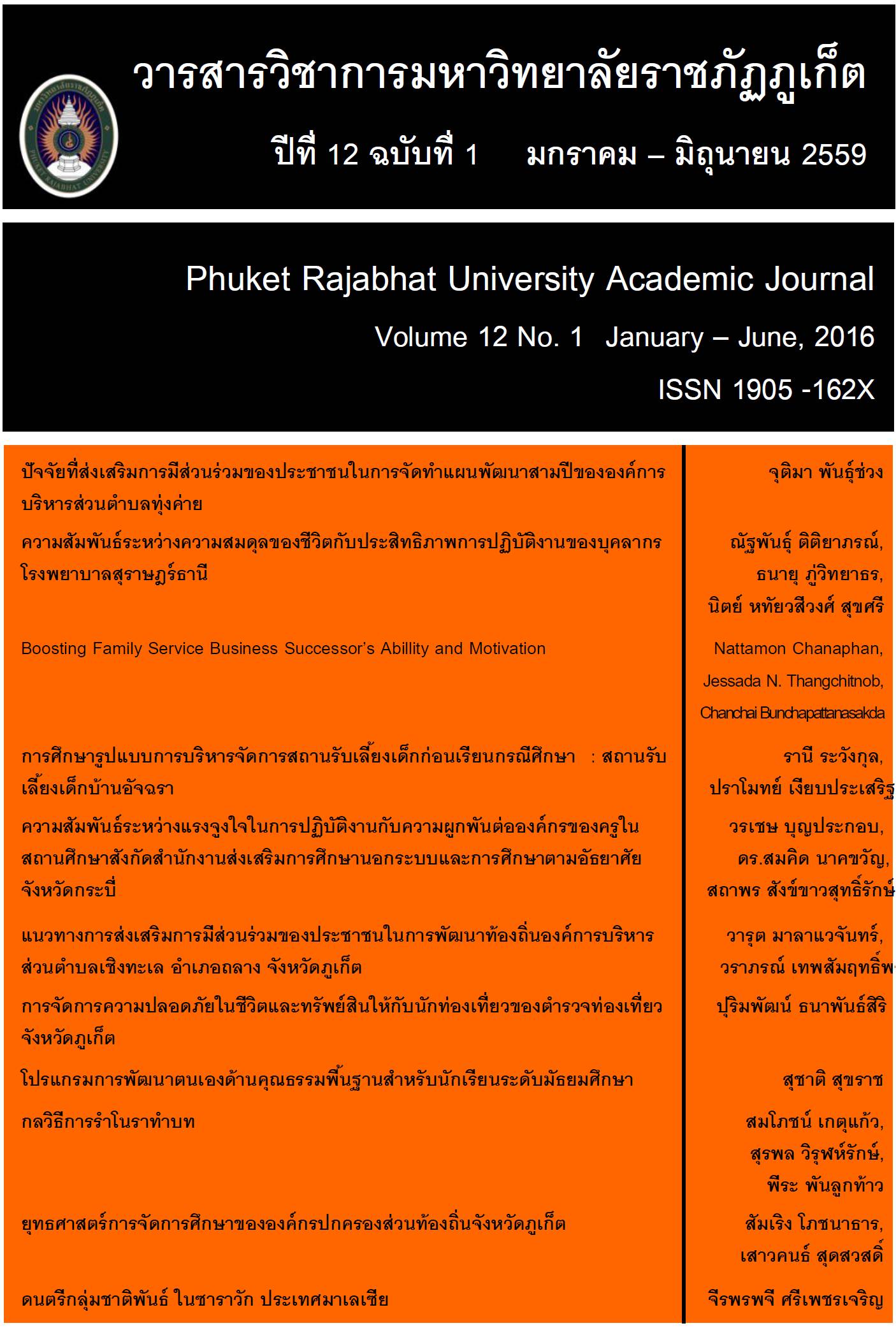การศึกษาเชิงชาติพันธุ์วรรณนาคืออะไรและวิจัยอย่างไร
Main Article Content
บทคัดย่อ
ปัจจุบันระเบียบวิธีวิจัยเชิงชาติพันธุ์มิได้ใช้เฉพาะงานด้านมานุษยวิทยาและสังคมวิทยาเท่านั้น ในวงการศึกษา Fraenkel และ Wallen (2007) ได้ให้ทัศนะว่า ระเบียบวิธีวิจัยเชิงชาติพันธุ์วรรณนาสามารถช่วยให้ผู้วิจัยเก็บข้อมูลได้อย่างครอบคลุมกว่าระเบียบวิธีวิจัยทางการศึกษารูปแบบอื่น ๆ ดังนั้นจึงกล่าวได้ว่าระเบียบวิธีวิจัยนี้สามารถนำมาเป็นอีกทางเลือกหนึ่งที่สามารถก่อให้เกิดประโยชน์สำหรับนักวิชาการและคณาจารย์ในมหาวิทยาลัยได้เป็นอย่างดี โดยเฉพาะอย่างยิ่งคณาจารย์ในมหาวิทยาลัย ราชภัฏทั่วประเทศที่ประสงค์จะทำงานวิจัยเพื่อพัฒนาท้องถิ่นโดยใช้ระเบียบวิธีวิจัยที่นอกเหนือไปจากกรอบการวิจัยที่ใช้แบบสำรวจ แบบสอบถาม การเปรียบเทียบผลสัมฤทธิ์ระหว่างก่อนเรียนกับหลังเรียน หรือการวิจัยเชิงปฏิบัติการในชั้นเรียนไปสู่งานวิจัยเชิงคุณภาพที่มีความเข้มข้นมากขึ้น ด้วยเหตุนั้นบทความปริทัศน์นี้จึงมีวัตถุประสงค์เพื่อทบทวนวรรณกรรมที่เกี่ยวข้องกับที่มาลักษณะเฉพาะ และวิธีดำเนินการวิจัยโดยใช้ระเบียบวิธีวิจัยเชิงชาติพันธุ์วรรณนาเป็นประเด็นหลัก โดยในส่วนแรกนั้นจะเป็นการทบทวนแนวคิดหลักและลักษณะเฉพาะของงานวิจัยประเภทนี้ ส่วนในที่สองเป็นการอธิบายรายละเอียดเกี่ยวกับวิธีวิจัยโดยเริ่มจากการให้แนวคิดในการเลือกพื้นที่วิจัย วิธีการเลือกผู้ให้ข้อมูล วิธีการตั้งคำถามวิจัย วิธีการเลือกเครื่องมือในการรวบรวมข้อมูล วิธีการลงภาคสนาม และวิธีการวิเคราะห์ข้อมูล ทั้งนี้เนื่องจากการใช้ระเบียบวิธีวิจัยประเภทนี้ผู้วิจัยต้องใช้เวลาเก็บข้อมูลภาคสนามด้วยตนเองทุกขั้นตอนอย่างเข้มข้นและต่อเนื่องเป็นเวลานาน รวมทั้งมีค่าใช้จ่ายที่ค่อนข้างสูง นักวิจารณ์บางคนจึงมีความเห็นว่าระเบียบวิจัยนี้เป็นภาระหนักสำหรับผู้วิจัย ดังนั้น นักวิชาการ คณาจารย์ ครูในโรงเรียน ผู้ฝึกอบรม และนักพัฒนาหลักสูตรการฝึกอบรมในวงการศึกษาจึงเลือกที่จะใช้ระเบียบวิธีวิจัยนี้ค่อนข้างน้อย อย่างไรก็ตาม แม้จะมีข้อวิพากษ์เหล่านี้อย่างต่อเนื่องแต่ผลที่ได้จากการใช้ระเบียบวิธีวิจัยนี้ก็ยังเป็นที่ยอมรับอย่างกว้างขวางว่าผู้วิจัยมิเพียงได้รับเฉพาะข้อมูลปฐมภูมิที่ครอบคลุมในแทบทุกมิติจากการลงภาคสนามที่สามารถช่วยให้ผู้วิจัยมีข้อมูลมากพอที่จะตีความรูปแบบการคิดและพฤติกรรมของผู้ถูกวิจัยได้ด้วยความเข้าใจอย่างลึกซึ้งเท่านั้นแต่กระบวนการวิจัยนี้ยังทำให้ผู้วิจัยเรียนมีโอกาสได้เรียนรู้ทักษะและความรู้ความเข้าใจในทฤษฎีการวิจัยเชิงคุณภาพมากขึ้นด้วย นอกจากนั้น บทความนี้ยังได้นำเสนอข้อควรระวังที่ผู้วิจัยจำเป็นต้องตระหนักถึงในการทำวิจัยประเภทนี้ไว้เป็นประเด็นสุดท้าย
Article Details
เนื้อหาและข้อมูลในบทความที่ลงตีพิมพ์ในวารสารวิชาการมหาวิทยาลัยราชภัฏภูเก็ต ถือเป็นข้อคิดเห็นและความรับผิดชอบของผู้เขียนบทความโดยตรง ซึ่งกองบรรณาธิการวารสารฯ ไม่จำเป็นต้องเห็นด้วยหรือร่วมรับผิดชอบใด ๆ
บทความ ข้อมูล เนื้อหา รูปภาพ ฯลฯ ที่ได้รับการตีพิมพ์ในวารสารวิชาการมหาวิทยาลัยราชภัฏภูเก็ต ถือเป็นลิขสิทธิ์ของวารสารวิชาการมหาวิทยาลัยราชภัฏภูเก็ต หากบุคคลหรือหน่วยงานใดต้องการนำทั้งหมดหรือส่วนหนึ่งส่วนใดไปเผยแพร่ต่อหรือเพื่อกระทำการใด ๆ จะต้องได้รับอนุญาตเป็นลายลักษณ์อักษรจากวารสารวิชาการมหาวิทยาลัยราชภัฏภูเก็ตก่อนเท่านั้น
เอกสารอ้างอิง
Angrosino, M. (2007). Doing ethnographic and observational research. Thousand Oaks : SAGE.
Atkinson, M. (1977). “Corners and the categorization of deaths as suicides” in P. Woods(1996). Researching the Art of Teaching : Ethnography for Educational Use, London : Routledge.
Atkinson, P. and Hammersley, M., (2007). What is ethnography? Ethnography, Principles in practice (3rd ed.). New York : Routledge.
Boyatzis, R., (1998), Transforming qualitative information : Thematic analysis and code development, Thousand Oaks: SAGE.
Braun. V. and Clark, V. (2006). “Using thematic analysis in psychology”. Qualitative Research in Psychology 3(2) : 77-101.
Briody, E., Fine, G., Graffman, K., Krawinkler, S., McCabe, M., Sunderland, P. and Denny, S. (2013). “Opinions : Ethnographic Methods in the Study of Business”, Journal of Business Anthropology, 2(2).
Buddharat, C., Hull , J. C. and Keyuravong, S. (2011). “Becoming an Ethnographer : A Personal Journey of an English Lecturer”, Proceedings of the International Conference : Doing Research in Applied Linguistics, King Mongkut’s University of Technology Thonburi, Bangkok , April 2011, pp. 1-10.
Cefkin, M. (2009). Introduction: Business, Anthropology, and the Growth of Corporate Ethnography. pp1 - 37, in Ethnography and the corporate encounter.
Cohen, L., Manion, L., and Morrison, K. (2007). Research Methods in Education, (6thed.), London : Routledge.
Creswell, J. (2007). Research design : Qualitative, quantitative and mixed methods approaches (2nd ed.), Thousand Oaks : SAGE.
Denscombe, M. (2003). The Good Research Guide: for small-scale social research Projects, (2nd ed.), Buckingham : Open University Press.
Emerson, R.M., Fretz, R.I., and Shaw, L.L., (1995). Writing Ethnographic Fieldnotes, Chicago : The University of Chicago Press.
Erlandson, D. A., Harris, E. L., Skipper, B. L., & Allen, S. D. (1993). Doing naturalistic inquiry. Newbury Park : SAGE.
Fetterman, D. (2010) Ethnography : Step by step (3rd ed.), Thousand Oaks : SAGE.
Fraenkel, J. & Wallen, N. (2007). How to Design and Evaluate Research in Education, Boston : McGrawHill.
Geertz, C. (1973). The interpretation of cultures : Selected essays. New York : Basic Books.
Genzuk, M. (2003). A synthesis of ethnographic research. Center for Multilingual, Multicultural Research Digital Papers Series. Center for Multilingual, Multicultural Research, University of Southern California. [On-line].Available : http://wwwrcf.usc.edu/~genzuk/Ethnographic_Research.html [2015, December 26,].
Heckathorn, D.D., (1997). “Respondent - Driven Sampling : A new approach to the study of hidden populations”, Social Problems, Vol. 44, No. 2, pp. 174-199.
Jordan, B., and Yamauchi, Y, (2008). “Beyond the University Teaching Ethnographic Methods in the Corporation”, Anthropology News, 49 (6), 35.
Kereluik, K., Mishra, P., Fahnoe, C., & Terry, L. (2013). “What knowledge is of most worth :Teacher knowledge for 21st century learning”, Journal of Digital Learning in Teacher Education, 29(4), 127-140.
LeCompte, M., & Schensul, J. (1999). Designing and Conducting Ethnographic Research. Walnut Creek : AltaMira.
Lichtman, M. (2003). Qualitative Research in Education : A User’s Guide (3rd ed.), London, SAGE.
Matthews, B. and Ross, L., (2010). Research Methods : a practical Guide for the Social Sciences, Edinburgh : Pearson Education.
Morris, C., Galuppi, B. E. and Rosenbaum, P. L. (2004). “Reliability of family report for the gross motor function classification system”, Developmental Medicine and Child Neurology, Vol. 46, pp. 455 - 460.
Nunan, D. (1998). Language Teaching Methodology. London : Prentice Hall.
Padgett, D. K. (1998). Qualitative methods in social work research : Challenges and rewards, Thousand Oaks: SAGE.
Padgett, D. K. (Ed.). (2004). The qualitative research experience. Belmont: Wadsworth/Thomson Learning.
Punch, K., F., (2009). Introduction Research Method in Education, Thousand Oaks : SAGE.
Rice, (1999). Qualitative research methods : a health focus. Oxford: Oxford: University Press.
Riemer, F.R. (2009). “Ethnography” in Lapan, S. & M. Quartaroli (Eds.). Research Essentials : An introduction to designs and practices. San -Francisco : Jossey – Bass
Saldana, J., (2009). The Coding Manual for Qualitative Researchers, Thousand Oaks : SAGE.
Sangasubana, N. (2011). How to conduct ethnographic research. The Qualitative Report, 16(2) : 567 - 573. [On-line]. Available : http://nova.edu/ssss/QR/QR16 - 2 /sangasubana.pdf [2015, January 18].
Singleton, R. A., & Straits, B. C. (2005). Approaches to social research (4th ed.), New York : Oxford University Press.
Stemler, S., (2001). An overview of content analysis. Practical Assessment, Research & Evaluation. 7(17). [On-line]. Available : http://PAREonline.net/ getvn.asp?v=7&n=17 [2016, June 1].
The Office of the Council of State of Thailand. (2004). The Rajabhat University Act 2004. [Online]. Available : http://president.uru.ac.th/legal_uru/prbraj.pdf [2016, May 17].
Varis, P. 2016. “Digital Ethnography” in Georgakopoulou, A. and Spilioti, T. (Eds.), The Routledge Handbook of Language and digital Communication, London : Routledge.
Vassar, M. and Goodson, L., (2011). An overview of ethnography in healthcare and medical education research. Journal of educational evaluation for health professions, 8(4).
Watson - Gegeo, K. A. (1988). Ethnography in ESL : Defining the essentials. TESOL Quarterly, 22(4) : 575-592.
Wellington, J. (2001). Educational Research : Contemporary issues and practical approaches, (2nd ed.), London : Bloomsbury.
Wolcott, H. F. (1999). Ethnography : A way of seeing. Walnut Creek, CA : Altamira Press.
Woods, P. (1996). Researching the art of teaching ethnography for educational use, London : Routledge.


